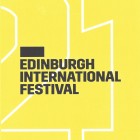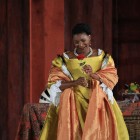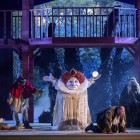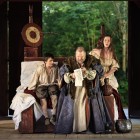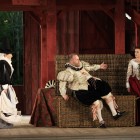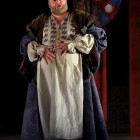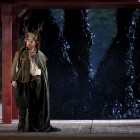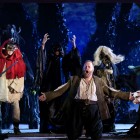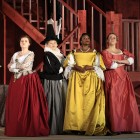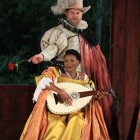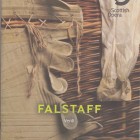Falstaff 2021Scottish Opera
Read more about the opera Falstaff
Sir David McVicar is always welcome home, with a series of productions over the years that have shown great imagination, and rarely put a foot wrong. McVicar, as well as directing, and designing the sets, was also responsible for the lavish period-style costumes
Given the prevailing restrictions due to Covid, some extra effort must have been needed, but it all seemed to run smoothly. The setting is Shakespearean, with a timbered gallery-style set influenced by Jacobean theatre, or perhaps the inn courtyards which may have preceded them.
Unlike the other Edinburgh Festival events in this year of recovery from pandemic, Falstaff was able to be performed in the spacious Festival Theatre. However it started with a run in the open air, in the car park of the company's production studios in Glasgow, where a successful Bohème was seen a few months previously. Appropriate safety measures were observed at both venues. In Edinburgh this did have the disadvantage that the theatre did seem very empty, but the acoustic did not seem to be damaged and the words came across very clearly.
The orchestra was slightly reduced in size and was invisible, spread across the back of the theatre stage. On the whole, Stuart Stratford conducted a wonderful performance, beautifully paced, and with expressive woodwinds, in particular, given sufficient prominence. Very tactful amplification was employed to assist not just the band, but also the choristers, who were largely concealed in the wings. One gathers that the sound was adjusted not just between evenings, but also between acts, at the earlier performances.
The work and the production
Most stagings of Falstaff put the emphasis firmly on comedy, using source material from The Merry Wives of Windsor, as Nicolai did fifty years earlier. However Verdi and Boito were scrupulous to include elements from the two parts of Henry IV in which Falstaff makes his first appearance. In these he is a brutish thug and highway robber, admittedly a cowardly one. This staging lets us see the nasty side of him, not so much with his young page boy, Robin, (neatly played by Fergus Wood, the baritone's son), but with the Garter Inn's serving wench, Doll Tearsheet, used and abused by the knight at will.
Falstaff is composed in six beautifully structured scenes, with two to each act. However with the aim of forestalling transmission of Coronavirus bugs in mind, intervals perforce were restricted. Taking a single interval, at the end of the second act 'laundry basket' scene, worked surprisingly well.
The OperaScotland team were distinctly fortunate in being able to attend two performances - the final pair of the Edinburgh run. By this time any obvious difficulties had disappeared.
The performers
The cast was uniformly excellent.
Roland Wood has been working his way through the baritone repertoire with Scottish Opera with some success over a number of years. The emphasis has definitely been on the serious - Luna and Golaud for example, but he was also good in comic parts early on. This first attempt at the great role is already well-formed, and will no doubt be a staple in his repertoire for many years ahead.
Elizabeth Llewellyn has precisely the kind of beautiful, creamy and soaring soprano that is ideal for Alice - not surprising as she was already an excellent Amelia (in Simon Boccanegra) a few seasons ago - and was the Mimì in that recent Bohème. She now also revealed a fine sense of comic timing.
Phillip Rhodes made an excellent Ford. He has only been seen here in vocally lighter work. Here he was played as a younger character than usual, and therefore distinctly more dangerous. His jealousy monologue was quite superb, and Alice appears to be in serious jeopardy for some time. It is to be hoped that Rhodes will return in some similar roles. The duet for Falstaff and 'Master Brook' was a highlight of the evening. Perhaps one of the few miscalculations in the staging came from the long entry of Falstaff in his finery. He takes time to negotiate the gallery, reducing the sense of shock both for Ford and the audience. Surely his appearance should be sudden.
Louise Winter is perhaps not known in Scotland for mainstream operatic work, having done some new pieces, but her extensive list of Mahler appearances in concert with the RSNO (including Song of the Earth) shows she has the kind of contralto voice required for Quickly. Her 'Reverenzas' were all beautifully timed. Sioned Gwen Davies succeeded in making a more three-dimensional figure of Meg, who often seems little more than a cipher.
Two genuine veterans, Jamie MacDougall and Alastair Miles, projected great character as Falstaff's henchmen. Usually Bardolph and Pistol are differentiated by height (tenors being traditionally short). Here Bardolph's lines were delivered in broad Scots, while Pistol was a Cockney. This was a clever way to take advantage of the unusual decision to sing in English.
The Nannetta of Gemma Summerfield was a performance of real vocal beauty - a lovely sweet sound throughout the evening, culminating in a gorgeous 'Sul fil d'un soffio' in Windsor Park. Her Fenton, Elgan Llýr Thomas, had some slightly uneasy moments on Thursday, but by Saturday everything was as it should be.
Unusually, the production was sung in English (Amanda Holden's version, first heard a ENO a few years ago). It was generally faithful to the original, and occasionally even managed an improvement. Sir John's bouncy little reminiscence about his years as page to the 'Duca di Norfolk' has always jarred, with its emphasis on the 'folk' instead of on 'Nor'. Her solution is simple - his service was with the 'noble Duke of York'.
Performance Cast
- Sir John Falstaff a knight
- Pistola Pistol, a follower of Falstaff
- Bardolfo Bardolph, a follower of Falstaff
- Caius Dr Caius, a Frenchman
- Meg Mistress Page
- Alice Mistress Alice Ford, wife of Ford
- Nannetta daughter of the Fords
- Quickly Mistress Quickly, a confidante of Alice and Meg
- Ford a merchant of Windsor
- Fenton a young gentleman
Production Cast
- Conductor
-
Stuart Stratford (Exc Jul 15)
Derek Clark (Jul 15)
- Director
- Designer - Sets
- Designer - Costumes
- Lighting
- Choreography
- Orchestra
- Translator
- Co-producer
- Sponsor
-
Dunard Fund (Glasgow)
Sir Ewan and Lady Brown (Edinburgh)
